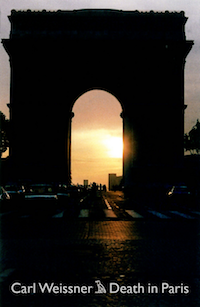 UPDATE: The book is now easily and inexpensively available in paperback.
UPDATE: The book is now easily and inexpensively available in paperback.
It’s lousy to promote anything on the Amazon these days because its effort to control the book trade has become repulsive. But here’s the rub: Death in Paris, by the late Carl Weissner, is now available as a Kindle e-book because Amazon has made it amazingly easy for a colleague of mine to post the thing. This is the blurb:
Death in Paris draws on the genre trappings of detective fiction, but any notion of conventional storytelling dissolves as rapidly as the characters and the plot. Weissner doesn’t refrain from convention so much as devour, twist, and mangle it with relish. Just as the two detective characters appear to be taking shape, they evaporate into a paranormal world. The fundamental premise of this audacious thriller is rather perverse: the central character is ‘your average psychopath who kills women and writes the occasional book.’ He has a Japanese sex doll — a ‘reusable victim’ custom-made to ‘produce exciting sounds when he strangles her’ — with which he reenacts sex scenes from pulp novels. The result is an entirely new genre: ‘Structuralist Death Metal Pulp.'” — Edward S. Robinson, Paraphilia Magazine
If you prefer to read print on paper or just like having the real artifact, Death in Paris is available as a paperback. At $10.99 the paperback costs only a dollar more than the e-book, but you’ll have to pay for postage and handling.
Carl Weissner was renowned in Germany for his translations of William S. Burroughs, Charles Bukowski, Bob Dylan, J.G. Ballard, Nelson Algren, and many others. His own writing, in English, included a cut-up collaboration with Burroughs and Claude Pélieu, So Who Owns Death TV? (1967); an experimental novel titled The Braille Film (1970); a book of cut-prose fiction, Cut Up or Shut Up (1972), co-written with Jürgen Ploog and Jan Herman; and two novels in German, Manhattan Muffdiver (2010) and Die Abenteur von Trashman (2011). A vanguardist to the end, Weissner experimented with language, published little mags, and kept an entire network of correspondents hooked on his remarkable letters. In an interview, Bukowski once said that “a letter from Carl always was and still is an infusion of life.” Weissner passed away in 2012.
Postscript: The one thing missing from that blurb is how mordantly funny Death in Paris is. It’s a book that made me laugh out loud. Reading Carl for his humor is a trip.




